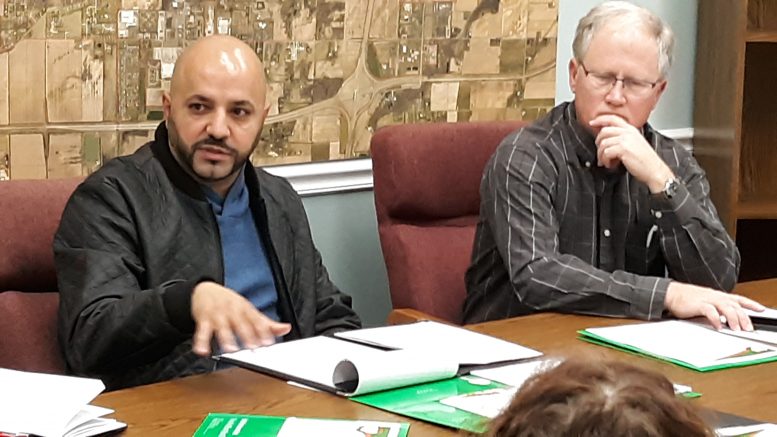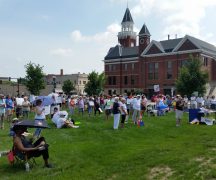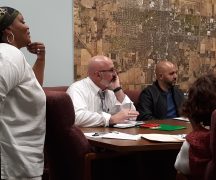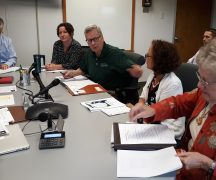By JAN LARSON McLAUGHLIN
BG Independent News
Bowling Green is working hard to be more welcoming to those who aren’t typical Northwest Ohioans.
Mayor Dick Edwards has talked about the value of America’s “welcome mat” when his own family immigrated to the U.S. from England and Scotland in the late 1800s and early 1900s.
“It was a chance for a better life,” he said of his family’s journey here.
Of course, times were different then. “The welcome mat was out for anyone with or without skills,” the mayor said last year.
Not so anymore.
In response to the yanking of the “welcome mat,” Bowling Green City Council passed a resolution in 2017 welcoming immigrants and “condemning any discrimination, harassment or unjustified deportation of immigrant residents.”
Last month, the first meeting of the Welcoming BG steering committee was held.
“To be blunt, a lot of this started when Donald Trump became president and a lot of people felt threatened” – especially people from the Latino and Muslim communities, said Bowling Green council member Bruce Jeffers.
“What can we really do to put some teeth in this,” Jeffers said to the steering committee members.
The goals of the Welcoming BG initiative are two-fold. First, finding people to fill local jobs.
“That’s the first thing – connecting employers with workers,” Jeffers said.
Second, making people feel at home in their new land.
“The next thing is creating a welcoming culture,” he said. “Wood County is full of a lot of good people. We want people to feel comfortable here.”
The steering committee has some experience with the need for welcoming efforts in the community.
Mojabeng Kamala, from South Africa, is the newly-hired part-time coordinator of the Welcoming BG program.
“I knew about the hate crimes that happened in our community but wasn’t aware that something was being done about it,” Kamala said. “I felt that as an immigrant and business owner, I would be an asset.”
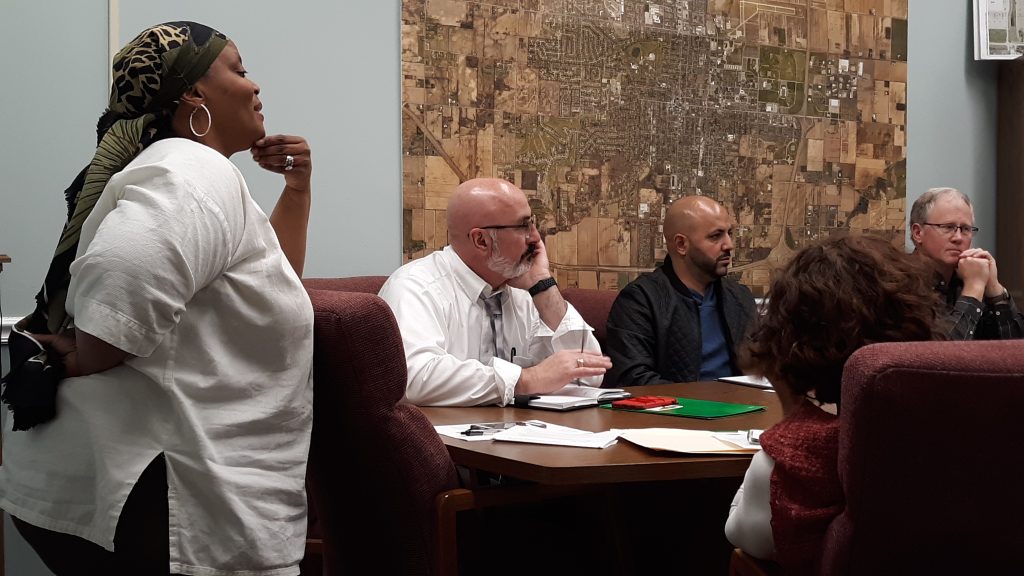
Kamala said she identifies with the obstacles immigrants face coming into the country.
“There is nothing more important than sitting across from someone who ‘gets it.’ I felt I could be that person another immigrant can relate to – spoken or unspoken,” she said.
Though Kamala has experienced discrimination in Bowling Green. “But fortunately the good outweighs the bad. I have been a target of racism in this town but the community of friends I have created for myself softens the blows and presents some type of normalcy,” Kamala said.
Beatriz Maya, is head of LaConexion of Wood County. She has confronted separation of families due to immigration law interpretations. She has fought for equity for people in the Latino community.
And Ammar Mufleh, who owns the Clazel property, has experienced racism here.
“We’re not the threat that you think we are,” he said. “I’ve always been a ghost in some ways. I’m not black. I’m not white. You learn to be a chameleon.”
Bowling Green initially wanted to put out a welcome mat to immigrants because it was the right thing to do morally. Then as city officials researched the idea, they discovered it was also the right thing to do economically.
As evidenced by the number of “now hiring” signs posted in the region, Bowling Green and Wood County economic development officials have been hearing for months that the region is running low on workers.
And while the success of the region and Wood County to bring jobs here is great, it has created a critical need to attract more workers to the area, said Sue Clark, director of Bowling Green’s economic development commission.
“That only makes the workforce demand more crucial,” Clark said last year during a meeting to get the Wood County commissioners on board.
Clark explained the local effort is being designed to welcome immigrants and refugees such as those escaping the war in Syria or the unrest in Central America.
“We’re not talking about bringing in illegal immigrants,” she said.
The initiative would also extend the welcome mat to international students who come to Bowling Green State University.
Edwards listed off some of the goals, such as addressing racism and discrimination, identifying access to health care, developing trust between immigrants and law enforcement, and working with schools to help new people settle in.
Also, employers need to be educated about hiring immigrants.
“It’s just hard to get employers in the county to deal with some of the hurdles” of hiring immigrants, Mufleh said.
Mufleh recalled hearing from a local economic development official that a supply chain warehouse was eyeing the Bowling Green area for a new site. But, instead, it built outside Philadelphia.
“It was very easy to check us off the list,” because of the lack of available workforce, and the state of local schools and housing options, he said. “We need good schools. We need good infrastructure.”
Others noted the racist attack earlier this year at Waffle House in Bowling Green, when two men of color were called racist names and then assaulted by two white men from south of Bowling Green.
“Of course, that turns them away,” Jeffers said of any welcoming efforts.
But Bowling Green’s response has been positive, others noted, with community meetings being held, and training offered on bystander intervention.
The issue of funding for the Welcoming BG program was also discussed. The city put the initial $36,000 into the program, which paid for a part-time employee to coordinate the pilot program.
“I hate to put all our great ideas together, and then six months down the road, there’s no money,” Mufleh said.
Bowling Green Municipal Administrator Lori Tretter said the city will soon be looking at its 2020 funding, and will be open to partnerships to help with the program.
The members of the Steering Committee are: Jennifer McCrary, BGSU Chief Diversity and Belonging Officer; Dr. Kefa Otiso, BGSU professor of geography and service excellence, and director of the Global Village; Dr. Susan Pena, director of School of Cultural and Critical Studies; Beatriz Maya, executive director of La Conexion; Ammar Mufleh, who owns the Clazel property; Lori Tretter, BG city administrator; Francis Scruci Bowling Green City Schools superintendent; Tony Hetrick, BG City chief of police; and Rob Spicer, senior pastor at St. Mark’s Lutheran Church.

